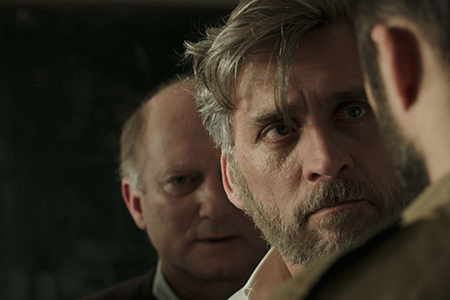Arts
Film
‘Foxtrot,’ a Powerful Film on War, Grief and Fate

It’s hard to believe that the Israeli film Foxtrot—shortlisted for an Oscar in the best foreign film category—is only director/screenwriter Samuel Maoz’s second film. His first, the excellent Lebanon, was told from the perspective of a frightened, young war-time tank crew; that film won the Golden Lion at the 2009 Venice Film Festival. But that earlier film did not portend Foxtrot, a bleakly comic movie that manages to be both thematically sweeping and subtle.
The film is divided into three distinct, stylistically different chapters. In the first, Dafna Feldman (Sarah Adler) faints when she sees officers from the Israel Defense Forces at the door of her Tel Aviv apartment. She knows why they’ve come; her son Jonathan has fallen in the line of duty.
The soldiers are prepared; a medic administers a sedative. They move on to the father, Michael Feldman, played by Lior Ashkenazi, most recently in the well-received Norman with Richard Gere. Michael seems paralyzed, too dazed to react not just to the devastating news but also for reasons that become clear later.
The first chapter also follows Michael, a former soldier, as he tries to find solace by visiting his mom, a survivor suffering from dementia, who calls him by his brother’s name and is in a world of her own.
The second chapter goes back to Jonathan, the son. He is on guard duty at Foxtrot, a remote checkpoint on a deserted section of road that more camels pass through than cars. Jonathan and his four fellow soldiers—all kids, really—sit around bored, waiting for the occasional Arabs to arrive at the checkpoint who are both humiliated by the searches by these young soldiers and resigned to them.
There is an overriding sense of doom, that the next carload of Arabs will bring death. And one does, though in an unexpected way that becomes a tragedy literally buried by the IDF.
The final chapter returns viewers to the Feldmans’ apartment, a constant in the movie, part of an endless traumatic cycle. Foxtrot is also a dance, Michael points out in the film: feet forward, feet to the side, feet backward, feet to the side, and look, you are right back where you started the dance.
To say more would spoil this tightly structured movie, one without a single frame out of place. But the overarching theme has to do with the nature of fate and being in the right place at the wrong time.
Moaz, 55, said in an interview that he wanted to make a film about two generations who have served in the military. The son of survivors, he remembers coming back from the 1982 Lebanon war with “10 fingers, 10 toes, I wasn’t burned.” And because his parents went through so much by comparison, he noted, “we had to repress our feelings and became an additional generation of trauma victims.”
Members of Jonathan’s generation have lived their entire life under the cloud of “an existential threat” to the state. Their actions may seem random but are almost inevitable, Maoz believes. “Fate cannot be changed because of the nature of trauma in Israel,” he stresses.
Foxtrot is filled with tiny, nuanced and seemingly unremarkable moments that, remarkably, Moaz ties together to make something larger than the sum of its parts. It is brilliantly acted; Ashkenazi won an Ophir, the Israeli equivalent of the Oscars, for best actor. Maoz’s film is a cinematic buffet that offers both emotional appeal and intellectual sustenance.










 Facebook
Facebook Instagram
Instagram Twitter
Twitter
Leave a Reply